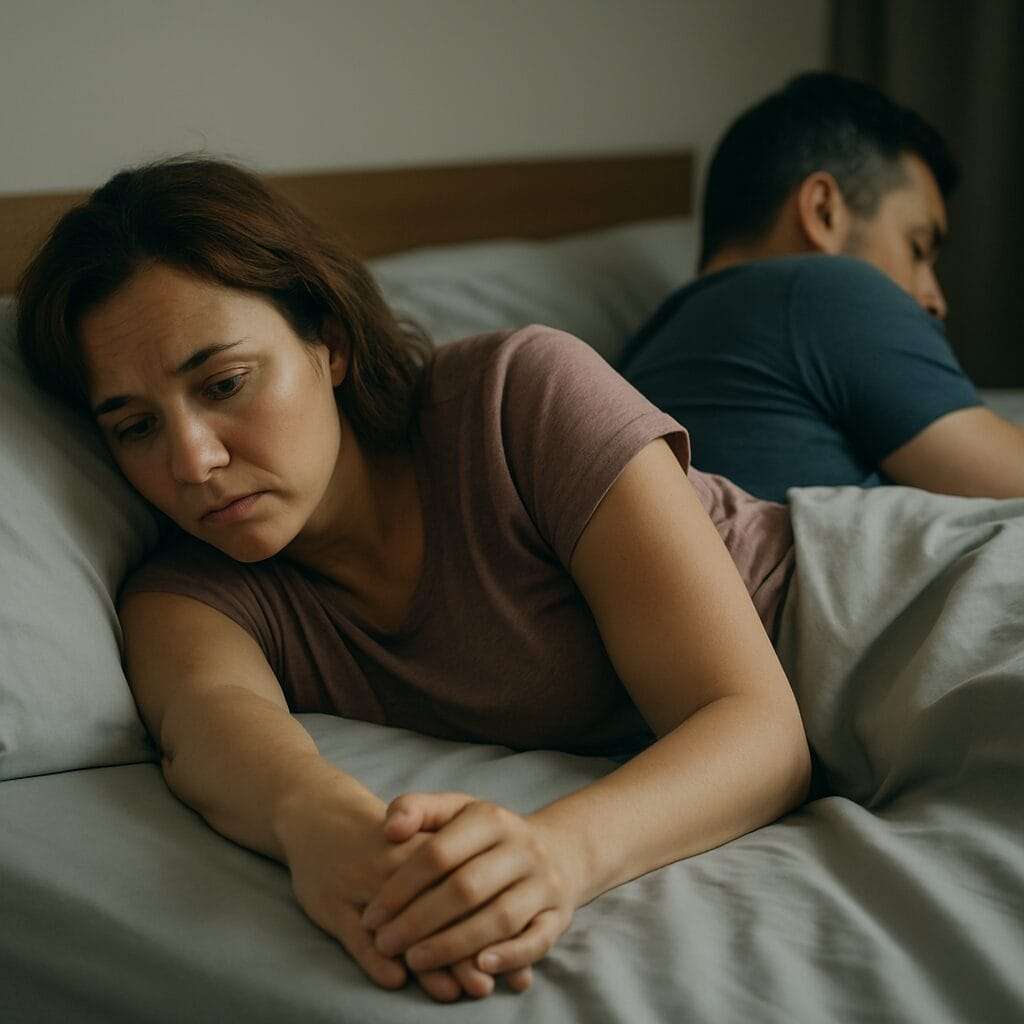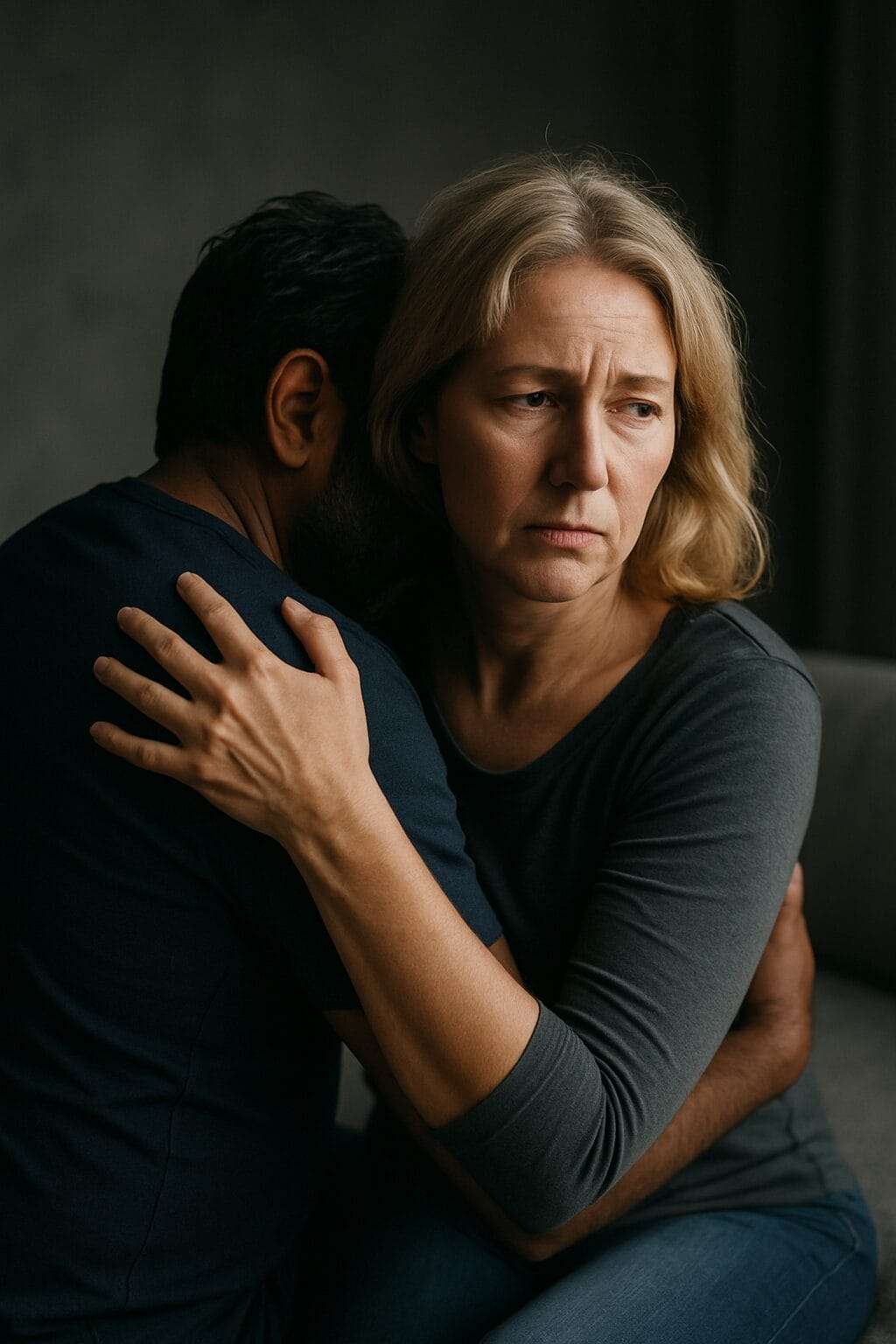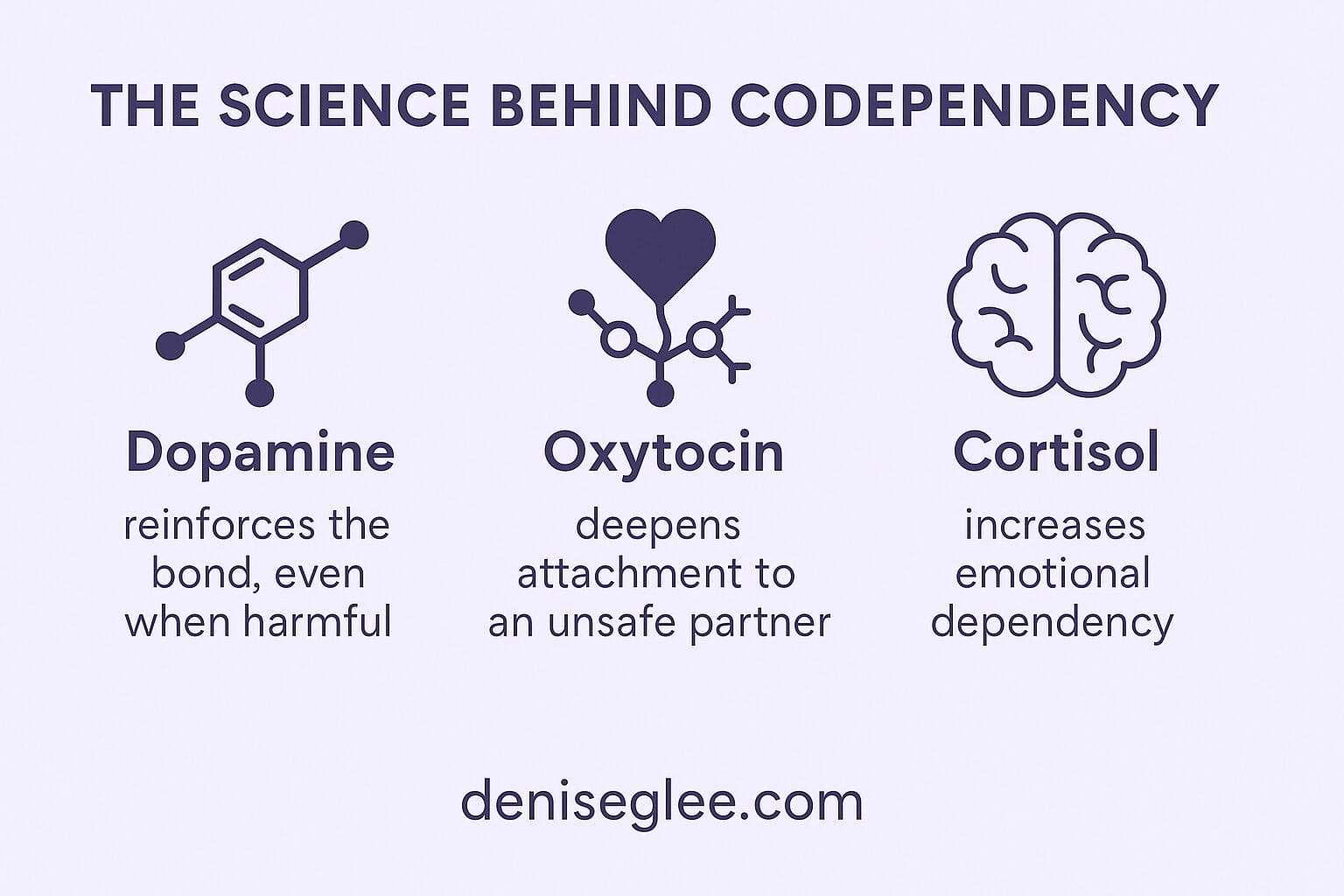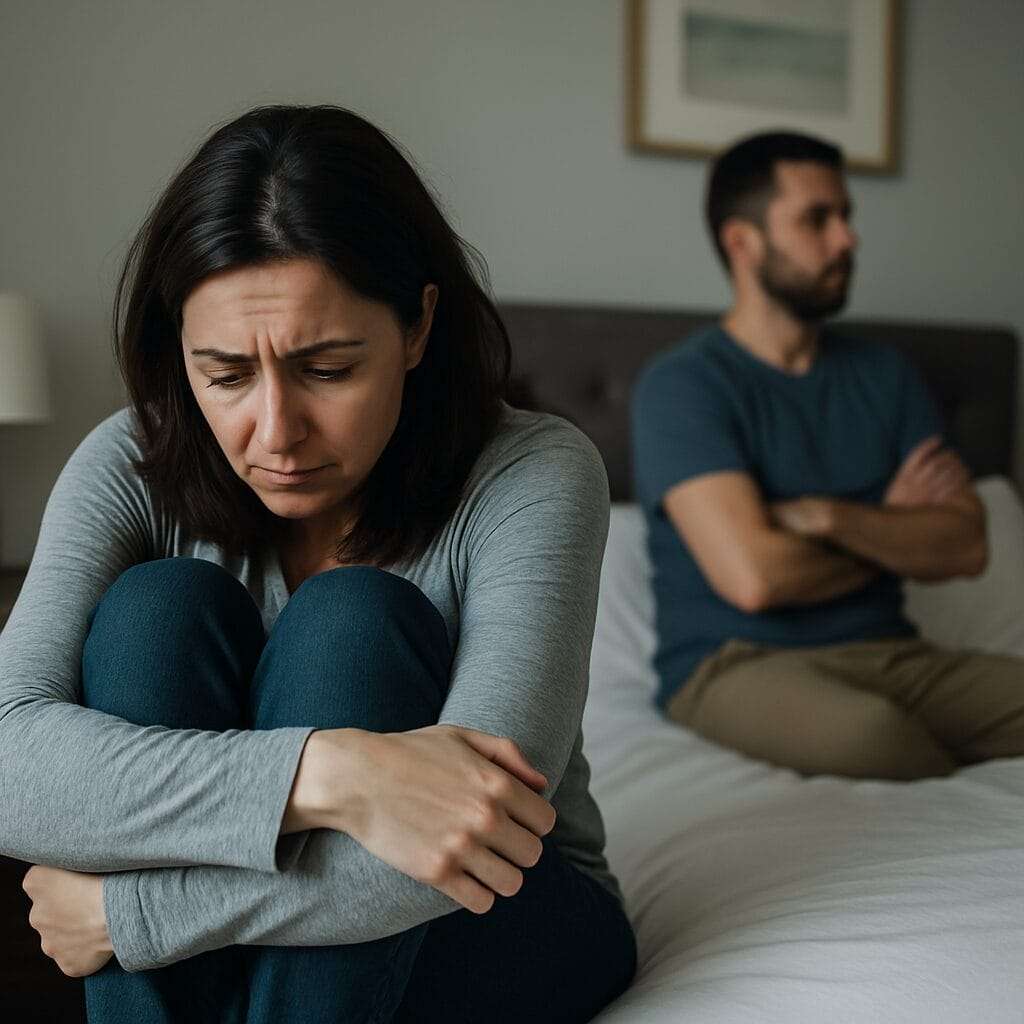- Updated: July 31, 2025
You’re smart. You’re capable. And yet… your relationship is draining you.
You tell yourself you’re focused on your goals—but hours disappear rereading texts, overanalyzing tone, and wondering if you’re the problem.
You’re not just anxious. You’re unraveling.
Your creativity, your drive, your clarity?
All bleeding out into a connection that feels more like survival than support.
I’m Denise G. Lee, a healing and leadership coach—and I see this pattern far too often.
High-achieving women and emotionally aware men burning out behind the scenes of relationships that look fine from the outside—but quietly devour their energy, ambition, and self-worth.
If that’s where you are, this isn’t your fault.
You’re not broken.
You’re caught in something deeper—and it’s time to name it.
Because you deserve more than emotional chaos.
You deserve clarity, peace, and love that doesn’t cost you your soul.
Your Romantic Healing Map
What Romantic Codependency Really Looks Like
It’s not “neediness”—it’s survival disguised as love.
Romantic codependency isn’t just about being “clingy” or “too nice.” It’s when your partner becomes your mirror, your oxygen, your proof that you’re lovable or worthy. And without them? You feel like nothing.
It’s calling or texting five, ten, fifteen times a day—not because you’re excited to connect, but because your nervous system is spiraling.
It’s tracking their location on “Find My Phone” because if they’re not responding, your mind fills in the worst-case scenario.
It’s trying to run your business or hold a meeting, but your eyes keep darting to your phone, wondering where they are, who they’re with, and why they’re not giving you what you need.
You say it’s love, but really? It’s survival.

This level of obsession rarely starts in adulthood. It usually begins in childhood—especially when your home was filled with emotional neglect, chaos, or inconsistent caregiving.
When you don’t get enough safety and attention as a child, your brain learns to confuse intensity with love. So when someone makes your heart race or gives you just enough breadcrumbs to feel special, you latch on.
And the saddest part? Our culture romanticizes this.
We’re sold the idea that suffering, longing, and endless devotion are signs of passion.
Pop songs, movies, and even spiritual teachings often reward unhealthy attachment disguised as love.
But real love doesn’t hollow you out.
It doesn’t hijack your time, your focus, or your sense of self.
And if that’s what you’re caught in?
You’re not crazy. You’re caught up in a trauma bond—and you can heal from it.
What Is a Trauma Bond (and Why Is It So Addictive?)
Why the worst relationships feel the hardest to leave.
A trauma bond is a powerful emotional attachment formed through cycles of intensity, confusion, and pain—often with brief moments of affection or false hope sprinkled in just enough to keep you hooked.

And if you’ve ever felt like walking away meant failing, you’re not alone.
Many people stay because, deep down, they’re trying to rewrite their origin story.
They think: If I can just make this person love me… maybe I’ll finally feel whole.
Maybe I’ll finally be chosen. Safe. Enough.
The truth? You’re not chasing them.
You’re chasing the resolution of all the old pain you never got to fix.
But unless you change how you connect, your adult relationships will keep echoing your childhood wounds. And adulthood? It lasts a lot longer.
The Hidden Science Behind Codependency
How your brain chemistry keeps you stuck on someone who hurts you.
There’s a reason it feels so hard to leave—because your brain is chemically hooked.
Romantic codependency isn’t just emotional exhaustion; it’s a neurochemical entanglement. The same brain systems that light up for love and connection also get triggered by chaos, fear, and inconsistency—especially if you were raised to associate pain with closeness.
That hit of dopamine after being ignored for hours?
The surge of adrenaline during a screaming match—followed by the apology, the sex, the sweet words?
It wires your nervous system to crave the rollercoaster, not just the person.
Even negative attention can trigger the brain’s reward system, reinforcing the bond. According to a Harvard Medical School article on the neuroscience of love, dopamine plays a central role in driving this cycle—rewarding us for moments of contact, even if they’re harmful.

And it doesn’t stop there:
Oxytocin, the “love hormone,” is released during intimacy, deepening your attachment—even if that attachment is to someone emotionally unsafe.
Cortisol, the stress hormone, stays elevated in chaotic relationships, clouding judgment and increasing emotional dependency.
So when you feel addicted to someone who mistreats you, you’re not “crazy”—you’re chemically wired into the dynamic.
👉 Read this post on how these hormones hijack clarity and keep you stuck in toxic love.
Now that you understand the biology of the trap, let’s talk about what it looks like when you’re living in it, day by day.
🚩 5 Signs You’re Trapped in a Codependent Relationship
From subtle self-erasure to full-blown burnout—here’s what to look for.
Romantic codependency rarely announces itself outright. It shows up in slow leaks—your time, your peace, your self-worth—until you barely recognize yourself. Here are five real-world signs that your relationship might be more of an emotional trap than a true partnership:

1. You’re Addicted to the Whiplash
You love the highs and lows equally—even if you hate to admit it.
The explosive fights followed by tearful apologies or wild intimacy feel intense… but that intensity is just a trauma echo. If you grew up in chaos, this kind of volatility may feel familiar—even comforting. You don’t trust calm anymore. You crave the rollercoaster.
2. You Stay, Even When It Hurts
They’ve humiliated you in public. Spent your money recklessly.
Maybe they’ve cheated—or worse.
And yet, something in you still says, But I love them.
Codependency turns leaving into a moral crisis. You worry that walking away means you’ve failed them—or that you’ll be alone forever.
3. You Numb Just to Cope
You’re not okay, but instead of facing the truth, you escape.
Drinking, binge-eating, overworking, zoning out online, compulsively shopping—it’s all emotional self-medication. You’re trying to survive what your heart knows isn’t right. And that survival mode is wearing you down.
4. You’ve Lost Yourself
You used to have hobbies, dreams, friends. Now everything orbits around them.
You change how you dress, speak, act—just to avoid setting them off. You say “we” more than “I,” but it’s not about unity. It’s about self-erasure. You don’t feel like you anymore.
5. You Defend the Very Thing That’s Destroying You
You’ve made excuses.
You’ve hidden bruises—emotional or otherwise.
You’ve told people, It’s not that bad.
Because admitting you’re in over your head feels humiliating. Maybe you even feel ashamed that you let it go this far. So you stay silent—until the pain becomes too loud to ignore.
🛠️ 6 Steps to Heal From Romantic Codependency
This isn’t just about fixing your love life. It’s about reclaiming your sense of self.
Codependency doesn’t grow in isolation. It’s often passed down—quietly, culturally, emotionally—from the people who didn’t know how to hold their own pain.
Maybe you watched a parent pour themselves into someone who never gave back.
Perhaps you were raised to believe love meant sacrifice, silence, or staying no matter what.
Abandonment for you isn’t a single moment—it was a slow erosion of being seen.
So healing? It’s not just about changing your relationship. It’s about confronting everything that made that relationship feel like home.
Here’s how to begin:

1. Own Your Story (Without Shame)
This didn’t come out of nowhere.
Get curious about how you were taught to love, tolerate, and disappear.
Was codependency your mother’s survival strategy?
Did your father equate control with care?
Naming the roots doesn’t blame—it frees.
2. Grieve What You Didn’t Get
This part hurts. You may realize the relationship was a cover-up for deeper wounds—like emotional neglect, rejection, or never feeling chosen.
Let yourself mourn that. Not just the partner, but the hope you pinned on them to finally heal what came before.
3. Detox From the Drama High
Chaos might feel like love. Silence might feel like punishment.
But these are nervous system reflexes—not truth.
Start noticing the difference between feeling alive and feeling triggered.
That gap? That’s where healing lives.
4. Get in the Room With Someone Who Sees Through the Performance
Healing alone is possible. But healing in safe, honest connection is powerful.
Whether it’s a trauma-informed coach or therapist—find someone who won’t let you gaslight yourself out of your own pain.
5. Rebuild a Life That Isn’t Centered on Proving Your Worth
Reclaim your interests. Feed your body. Learn to rest without guilt.
You are not a rehabilitation center for broken partners.
Build a life that nourishes you with or without applause.
Read this: When Goals Stop Working: How to Create a Customized Life Plan That Lasts
6. Practice Boundaries That Honor Your Nervous System
Boundaries aren’t about controlling others—they’re about not abandoning yourself.
You’re allowed to say “no” without explaining.
You’re allowed to leave the conversation, the relationship, or the family text thread.
Every boundary is a yes to your peace.
Read this: Emotional Boundaries Aren’t Just Self-Care—They’re Survival
You’re Not Broken—You’re Waking Up
If you’ve seen yourself in these patterns, take a deep breath.
This isn’t a sign that you’re broken. It’s a sign that you’re ready to heal.
Romantic codependency often starts long before the relationship begins. It’s woven through the stories you were told, the love you had to earn, and the parts of yourself you had to hide just to be “enough.”
But you’re allowed to break the pattern.
You’re allowed to choose peace over performance.
And you’re allowed to rebuild—on your terms.
Whether you’re still in the relationship or finally stepping away, you don’t have to untangle it all alone.
Go Deeper
💛 Work with me, Denise G. Lee – I help emotionally aware leaders heal what’s hidden and reclaim their power—without shame, gimmicks, or toxic positivity.
👉 Explore coaching here
🎙️ Prefer to listen?
Check out my podcast for real talk on trauma, self-trust, and what healing looks like behind the scenes.
👉 The Introverted Entrepreneur
📬 Got thoughts or a story to share?
I welcome your reflections.
👉 Reach out to me directly
And just in case no one’s told you lately—
You are not too much. You are not too late.
You are worth a relationship that doesn’t cost you your identity.



